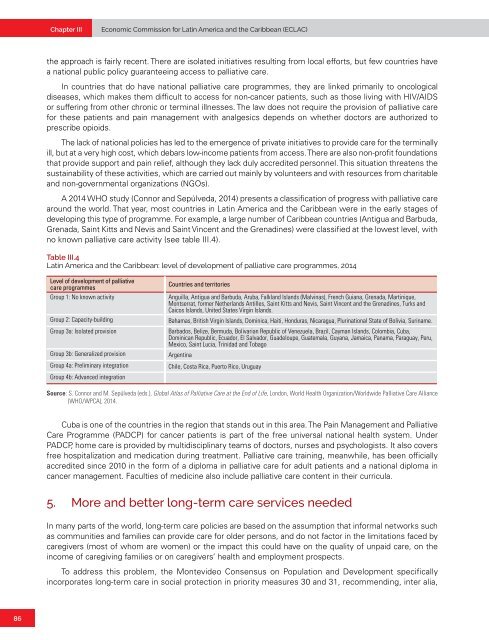Draft first regional report on the implementation of the Montevideo Consensus on Population and Development
This draft report seeks to give an account of progress in the implementation of the priority measures of the Montevideo Consensus on Population and Development in the region, as well as the differences between countries in terms of the degree of implementation. By highlighting relevant national experiences, it also seeks to facilitate the exchange of good practices among countries so that they can benefit from each other in their efforts to advance the implementation of the actions of the Montevideo Consensus.
This draft report seeks to give an account of progress in the implementation of the priority measures of the Montevideo Consensus on Population and Development in the region, as well as the differences between countries in terms of the degree of implementation. By highlighting relevant national experiences, it also seeks to facilitate the exchange of good practices among countries so that they can benefit from each other in their efforts to advance the implementation of the actions of the Montevideo Consensus.
You also want an ePaper? Increase the reach of your titles
YUMPU automatically turns print PDFs into web optimized ePapers that Google loves.
Chapter III<br />
Ec<strong>on</strong>omic Commissi<strong>on</strong> for Latin America <strong>and</strong> <strong>the</strong> Caribbean (ECLAC)<br />
<strong>the</strong> approach is fairly recent. There are isolated initiatives resulting from local efforts, but few countries have<br />
a nati<strong>on</strong>al public policy guaranteeing access to palliative care.<br />
In countries that do have nati<strong>on</strong>al palliative care programmes, <strong>the</strong>y are linked primarily to <strong>on</strong>cological<br />
diseases, which makes <strong>the</strong>m difficult to access for n<strong>on</strong>-cancer patients, such as those living with HIV/AIDS<br />
or suffering from o<strong>the</strong>r chr<strong>on</strong>ic or terminal illnesses. The law does not require <strong>the</strong> provisi<strong>on</strong> <strong>of</strong> palliative care<br />
for <strong>the</strong>se patients <strong>and</strong> pain management with analgesics depends <strong>on</strong> whe<strong>the</strong>r doctors are authorized to<br />
prescribe opioids.<br />
The lack <strong>of</strong> nati<strong>on</strong>al policies has led to <strong>the</strong> emergence <strong>of</strong> private initiatives to provide care for <strong>the</strong> terminally<br />
ill, but at a very high cost, which debars low-income patients from access. There are also n<strong>on</strong>-pr<strong>of</strong>it foundati<strong>on</strong>s<br />
that provide support <strong>and</strong> pain relief, although <strong>the</strong>y lack duly accredited pers<strong>on</strong>nel. This situati<strong>on</strong> threatens <strong>the</strong><br />
sustainability <strong>of</strong> <strong>the</strong>se activities, which are carried out mainly by volunteers <strong>and</strong> with resources from charitable<br />
<strong>and</strong> n<strong>on</strong>-governmental organizati<strong>on</strong>s (NGOs).<br />
A 2014 WHO study (C<strong>on</strong>nor <strong>and</strong> Sepúlveda, 2014) presents a classificati<strong>on</strong> <strong>of</strong> progress with palliative care<br />
around <strong>the</strong> world. That year, most countries in Latin America <strong>and</strong> <strong>the</strong> Caribbean were in <strong>the</strong> early stages <strong>of</strong><br />
developing this type <strong>of</strong> programme. For example, a large number <strong>of</strong> Caribbean countries (Antigua <strong>and</strong> Barbuda,<br />
Grenada, Saint Kitts <strong>and</strong> Nevis <strong>and</strong> Saint Vincent <strong>and</strong> <strong>the</strong> Grenadines) were classified at <strong>the</strong> lowest level, with<br />
no known palliative care activity (see table III.4).<br />
Table III.4<br />
Latin America <strong>and</strong> <strong>the</strong> Caribbean: level <strong>of</strong> development <strong>of</strong> palliative care programmes, 2014<br />
Level <strong>of</strong> development <strong>of</strong> palliative<br />
care programmes<br />
Group 1: No known activity<br />
Group 2: Capacity-building<br />
Group 3a: Isolated provisi<strong>on</strong><br />
Group 3b: Generalized provisi<strong>on</strong><br />
Group 4a: Preliminary integrati<strong>on</strong><br />
Group 4b: Advanced integrati<strong>on</strong><br />
Countries <strong>and</strong> territories<br />
Anguilla, Antigua <strong>and</strong> Barbuda, Aruba, Falkl<strong>and</strong> Isl<strong>and</strong>s (Malvinas), French Guiana, Grenada, Martinique,<br />
M<strong>on</strong>tserrat, former Ne<strong>the</strong>rl<strong>and</strong>s Antilles, Saint Kitts <strong>and</strong> Nevis, Saint Vincent <strong>and</strong> <strong>the</strong> Grenadines, Turks <strong>and</strong><br />
Caicos Isl<strong>and</strong>s, United States Virgin Isl<strong>and</strong>s.<br />
Bahamas, British Virgin Isl<strong>and</strong>s, Dominica, Haiti, H<strong>on</strong>duras, Nicaragua, Plurinati<strong>on</strong>al State <strong>of</strong> Bolivia, Suriname.<br />
Barbados, Belize, Bermuda, Bolivarian Republic <strong>of</strong> Venezuela, Brazil, Cayman Isl<strong>and</strong>s, Colombia, Cuba,<br />
Dominican Republic, Ecuador, El Salvador, Guadeloupe, Guatemala, Guyana, Jamaica, Panama, Paraguay, Peru,<br />
Mexico, Saint Lucia, Trinidad <strong>and</strong> Tobago<br />
Argentina<br />
Chile, Costa Rica, Puerto Rico, Uruguay<br />
Source: S. C<strong>on</strong>nor <strong>and</strong> M. Sepúlveda (eds.), Global Atlas <strong>of</strong> Palliative Care at <strong>the</strong> End <strong>of</strong> Life, L<strong>on</strong>d<strong>on</strong>, World Health Organizati<strong>on</strong>/Worldwide Palliative Care Alliance<br />
(WHO/WPCA), 2014.<br />
Cuba is <strong>on</strong>e <strong>of</strong> <strong>the</strong> countries in <strong>the</strong> regi<strong>on</strong> that st<strong>and</strong>s out in this area. The Pain Management <strong>and</strong> Palliative<br />
Care Programme (PADCP) for cancer patients is part <strong>of</strong> <strong>the</strong> free universal nati<strong>on</strong>al health system. Under<br />
PADCP, home care is provided by multidisciplinary teams <strong>of</strong> doctors, nurses <strong>and</strong> psychologists. It also covers<br />
free hospitalizati<strong>on</strong> <strong>and</strong> medicati<strong>on</strong> during treatment. Palliative care training, meanwhile, has been <strong>of</strong>ficially<br />
accredited since 2010 in <strong>the</strong> form <strong>of</strong> a diploma in palliative care for adult patients <strong>and</strong> a nati<strong>on</strong>al diploma in<br />
cancer management. Faculties <strong>of</strong> medicine also include palliative care c<strong>on</strong>tent in <strong>the</strong>ir curricula.<br />
5. More <strong>and</strong> better l<strong>on</strong>g-term care services needed<br />
In many parts <strong>of</strong> <strong>the</strong> world, l<strong>on</strong>g-term care policies are based <strong>on</strong> <strong>the</strong> assumpti<strong>on</strong> that informal networks such<br />
as communities <strong>and</strong> families can provide care for older pers<strong>on</strong>s, <strong>and</strong> do not factor in <strong>the</strong> limitati<strong>on</strong>s faced by<br />
caregivers (most <strong>of</strong> whom are women) or <strong>the</strong> impact this could have <strong>on</strong> <strong>the</strong> quality <strong>of</strong> unpaid care, <strong>on</strong> <strong>the</strong><br />
income <strong>of</strong> caregiving families or <strong>on</strong> caregivers’ health <strong>and</strong> employment prospects.<br />
To address this problem, <strong>the</strong> M<strong>on</strong>tevideo C<strong>on</strong>sensus <strong>on</strong> Populati<strong>on</strong> <strong>and</strong> <strong>Development</strong> specifically<br />
incorporates l<strong>on</strong>g-term care in social protecti<strong>on</strong> in priority measures 30 <strong>and</strong> 31, recommending, inter alia,<br />
86


















